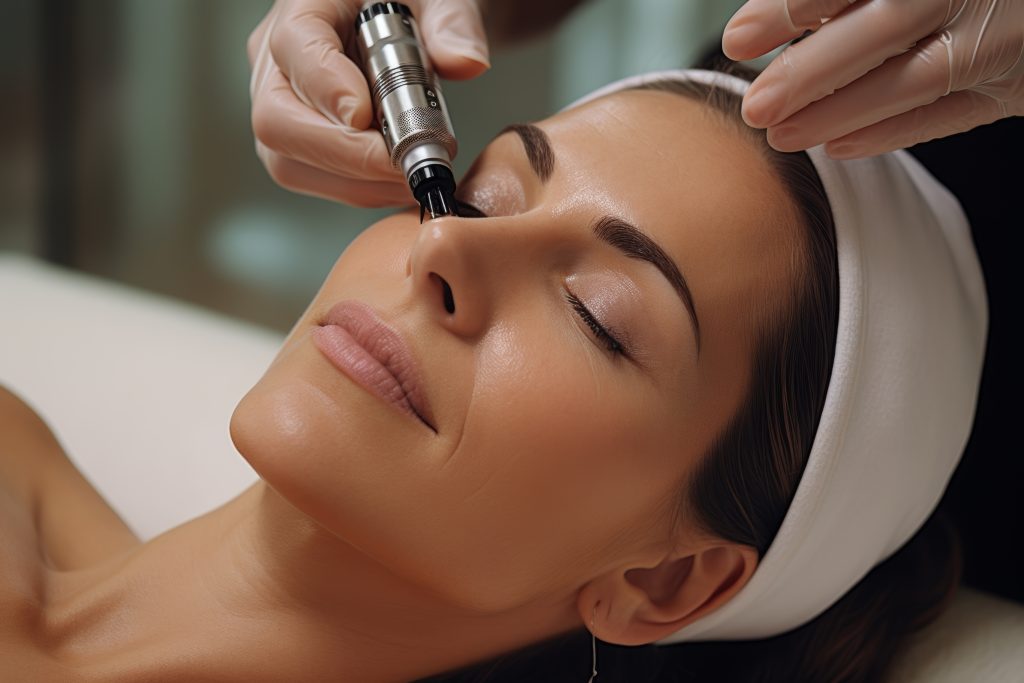
Feeling great often means looking your best, and there’s no better way to achieve that than by rejuvenating your skin.
Human skin takes a lot of wear and tear from daily life, so it’s natural to give it some extra love and care. But with so many products and treatments now, it can be overwhelming to know where to start. Don’t worry; we’ve gathered some expert tips and tricks to help you on your journey to glowing, youthful skin.
Consult a Dermatologist or Skincare Specialist
Your best bet is probably to consult with a specialist, especially if your symptoms are persistent, severe, or causing significant concern.
So, what will the process involve? First, the professional will evaluate your symptoms and discuss your medical history. They might use diagnostic tools or conduct tests to pinpoint the issue. Based on their findings, they’ll recommend a treatment plan, which may include advanced technologies or other therapeutic options.
One example is the skin rejuvenation machine for beauty and aesthetic clinics by InMode or any other reputable brand. This device uses cutting-edge technology to improve skin texture, reduce wrinkles, and address pigmentation issues. The specialist will guide you through the recommended treatments, explaining how they work, what to expect during each session and any potential side effects.
Nourish Your Skin from Within
Not only can professionals help you achieve healthy skin. What you eat or put into your body matters, too. Your skin loves healthy food as much as you do!
A balanced diet rich in essential nutrients can do wonders for your skin. Focus on incorporating foods high in vitamins C and E, which may aid in collagen production and protect against damage from free radicals. Fresh fruits, vegetables, nuts, and whole grains should be central to your daily meals. Since your skin mirrors your overall health, it’s crucial to nourish it from within.
Keep Hydrated
Drinking plenty of water is one of the simplest yet most effective ways to rejuvenate your skin. Water helps flush out toxins and keeps your skin hydrated from within. Aim for at least eight glasses a day. If plain water feels too monotonous, try adding a splash of lemon or cucumber for a refreshing twist.
Exfoliate
Exfoliating can remove those pesky dead skin cells that can clog your pores and cause breakouts. Plus, it promotes cell turnover, which can help smooth out fine lines and wrinkles. Whether you prefer a physical scrub or a chemical exfoliant like glycolic or salicylic acid, just remember to be gentle.
Ideally, you should exfoliate once a week if you have sensitive skin. For those with normal to oily skin, exfoliating two to three times a week is usually sufficient. Over-exfoliating can irritate your skin and strip away its natural oils, so it’s important to find a balance. Listen to your skin and adjust your routine as needed.
Moisturize
There are many reasons why moisturizing is essential for healthy skin. Moisturizers help lock in moisture, preventing dryness and flakiness. They create a protective barrier on the skin’s surface, shielding it from environmental stressors like pollution and harsh weather.
The question is, when should you apply moisturizer for the best results? Experts say that moisturizing before bedtime is particularly beneficial. At night, your skin is in repair mode, and applying moisturizer helps support this process by keeping the skin hydrated and nourished.
Choose a moisturizer that suits your skin type. For dry skin, opt for richer, cream-based products. If you have oily skin, lightweight, gel-based moisturizers can provide the hydration you need without clogging your pores.
Wear Sun Protection
Sun damage is a leading cause of age spots, premature aging and age spots, making sun protection essential for maintaining youthful skin. Use a broad-spectrum sunscreen with at least SPF 30 every day, even on cloudy days, and reapply every two hours if you’re outdoors. Hats and sunglasses can offer additional protection. Don’t forget to apply sunscreen indoors as well, as UV rays can penetrate windows. Overall, wearing sun protection cream is non-negotiable.
Get Your Beauty Sleep
Ever notice how your skin looks a bit lackluster after a late night? There’s a reason for that. While you’re snoozing away, your skin is hard at work, patching up the day’s wear and tear.
Aim for 7-9 hours of quality sleep each night. Your body uses this time to repair skin cells, boost collagen production, and restore moisture levels. During deep sleep, blood flow to the skin increases, allowing vital nutrients to reach the surface and facilitate healing. A consistent sleep routine can help your skin stay balanced and resilient, reducing the appearance of dark circles and fine lines.
Embrace a Healthy Lifestyle
Your lifestyle choices have a big impact on your skin’s health. And this is beyond nurturing your body with a balanced diet rich in fruits, vegetables, and lean proteins. That means getting rid of habits like smoking and cutting back on alcohol, as these can contribute to premature aging and dullness.
Regular exercise is also key—it boosts circulation, helping to deliver essential nutrients not only to your skin but also to your overall well-being. Taking care of your body will naturally reflect on your skin, making it look more vibrant and youthful.
Takeaway
Having a revitalized and fresher complexion is more attainable than you might think. Keep in mind that consistency is the secret—small changes can lead to big improvements over time. Just weave these practical tips into your daily routine and enjoy the confidence boost that comes from feeling great in your own skin.

